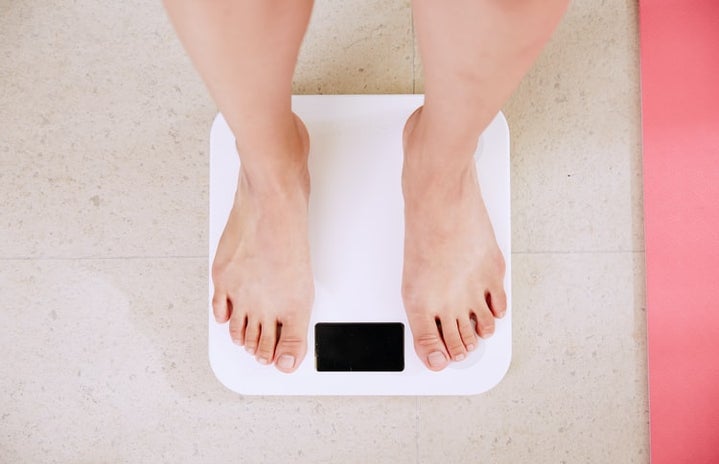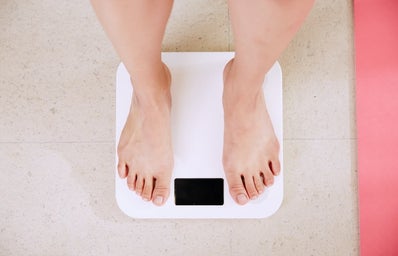It seems like everywhere you turn these days there’s a new must-try diet guaranteed to help you lose weight and have more energy. Or, maybe a celebrity flaunting their weight loss and six-pack on a magazine cover, and some Instagram influencer giving you major life envy, attempting to get you to buy dietary supplements and teas that will miraculously make your life Instagram-worthy too.
The health, fitness and diet industry has swelled into a billion-dollar industry offering a plethora of “solutions” to all our body insecurities and weight loss struggles. Social media’s prevalence in the daily lives of college-aged women has also made it easier than ever to get bombarded by advertisements. And they all seem to hint at the same thing.
You’re not good enough. You’re not skinny enough. You don’t look as good as you would if you just tried this. Look at how amazing your life could be.
Your body is not the bad guy

“A lot of college women have a tendency to make their bodies the enemy,” explains Sarah Hays Coomer, author of Physical Disobedience. “They try to conquer what they see as ‘imperfections’ rather than strengthening and empowering their bodies for the challenges ahead.”
This attitude is flawed for so many reasons, but for one thing, biology and the scientific facts are on your side.
College is a time where you might experience a lot of changes, including to your body and your weight. You’re getting out of the teenage years where you could live on pasta alone and still wear a size zero, and into a new phase of adult weight management.
“[College-aged women] are just coming into their adult bodies, so the extra curves and quirks can feel unwelcome and the pursuit of weight loss can become a full-blown obsession,” says Coomer. “Unfortunately, this often leads to more weight gain and a lifelong struggle with food. Bad habits like starving to control their diets become commonplace, and the resulting hunger is often followed by overeating and weight gain, which perpetuates the cycle.”
Your body will process foods differently than when you were 16, your energy levels will be different when it comes to exercising, and sometimes, it’s just downright difficult to be healthy in college. However, there’s a difference between being healthy and crash dieting or skipping meals to fit into some preconceived notion of what you should look like.
Related: How to Establish & Maintain a Healthy Relationship with Exercise
Balance is essential

It might seem hard to find a middle ground between not caring at all and becoming obsessive. How can you live a healthy, balanced lifestyle in the midst of all the diet-centered, fitness-crazed chaos?
“Think about your good qualities and recognize that weight is just a number,” advises Catherine Markley, a sophomore at the University of Notre Dame. “Get into a workout routine that helps strengthen your muscles but also allows you to have fun while exercising.”
Comparing your body to those of your friends is far from helpful, because from a basic biology standpoint, your bodies are going to respond to diet and exercise in different ways. Allow your friends who live a healthy lifestyle to be a source of inspiration and guidance rather than a source of envy.
“Becoming observant of how your friends, whom you feel are healthy and positive in their life, act around food and self-care can provide insight and knowledge,” explains Carol Lourie of Natural Health Care & Healing Center.
Tune out the negativity — even if it surrounds you

And why do we specifically as college women seem particularly susceptible to a weight focused lifestyle in the first place?
In some ways, it has to do with the environment we were raised in.
“Enculturation is a factor — social and cultural messages tend to objectify, demean or disrespect women,” says Adina Arden Cooper, a licensed professional counselor and certified life coach. “That attitude gets internalized, so women undervalue themselves as a result. The degree to which any of these factors impact an individual varies. Some people are innately sensitive or have life experiences that make it harder to withstand negative influences.”
Negative influences like body shaming, unhealthy language about weight and food and an overall environment cultivating negative body image are nothing new to many women of our generation, and can undermine self-esteem as a result.
It’s enough to make any college woman body-conscious, or even completely fixated on weight. But why let a number on a scale, a dress or a social media account define you? Losing an extra five pounds or dropping two dress sizes isn’t worth the emotional and psychological damage obsessing over your weight can do.

